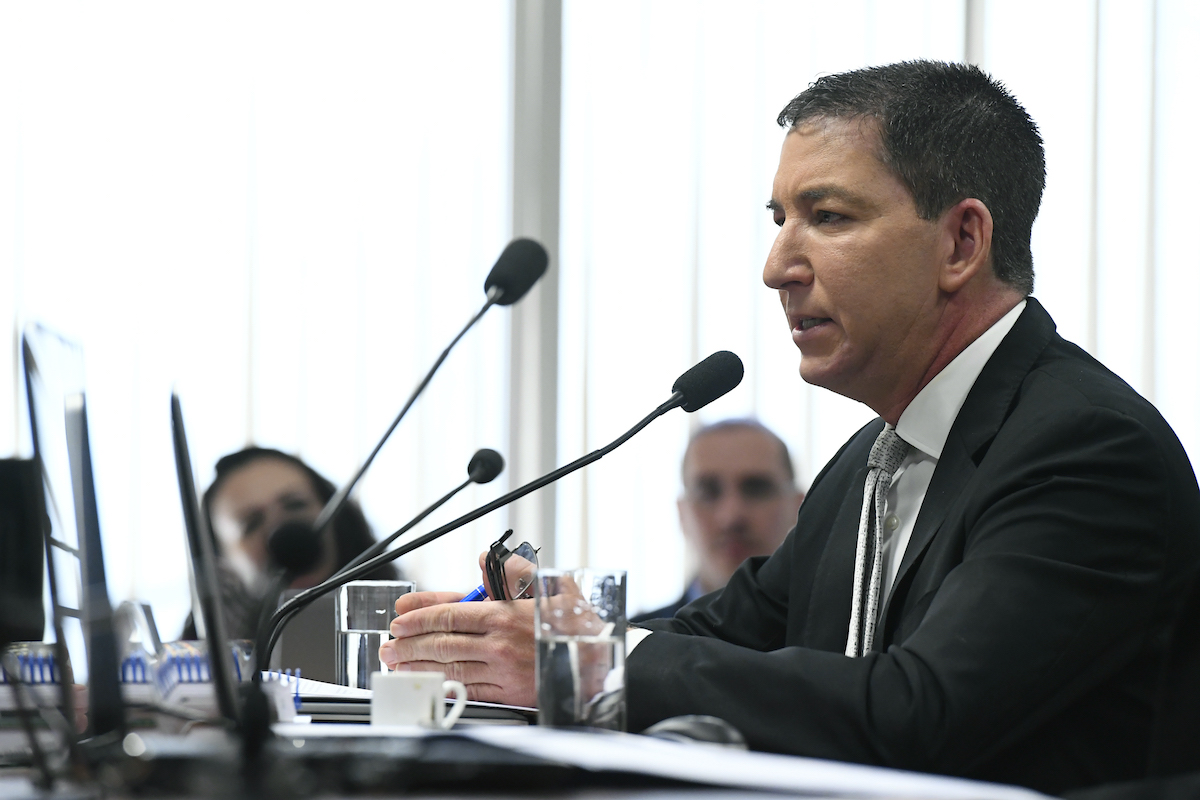Activism
How The Intercept Abandoned Its Truth-Seeking Mission—And Lost Its Best Journalist
In the case of the media, we’ve had a running social experiment underway since 2015 that helps us answer this question.

Journalist Glenn Greenwald shocked his global readership on Thursday, when he abruptly announced his resignation from the Intercept, the six-year-old site that became famous after publishing documents released by Edward Snowden. The incident that sparked Greenwald’s departure was the Intercept’s refusal to publish in whole an article he’d written criticizing much of the US media for failing to seriously cover allegations by a former business associate of Hunter Biden—son of Democratic presidential candidate Joe Biden—that the Biden family had used its name to profit from business deals in foreign countries where the United States has important foreign-policy interests.
Since his early days at the Intercept, which Greenwald co-founded in 2014 with left-wing journalist Jeremy Scahill and documentary filmmaker Laura Poitras, he operated under an agreement stipulating that his columns would be published without the requirement that they be edited by colleagues. In a lengthy statement posted to his new Substack page, Greenwald argues that politically motivated Intercept editors violated this agreement in regard to his latest article, by “refusing to publish it unless I remove all sections critical of Democratic presidential candidate Joe Biden, the candidate vehemently supported by all New-York-based Intercept editors involved in this effort at suppression.” In his post, Greenwald situated this disagreement within the context of a Trump-era newsroom culture—and a broader trend within established journalistic circles—that excludes political dissent.
I have some personal knowledge of Greenwald’s relationship with the Intercept because I worked at its Washington bureau as a politics reporter between 2015 and 2018. Full disclosure: I consider Glenn to be not only a former associate, but also a friend—which makes me a less than perfectly impartial observer.
When the Intercept began operating in 2014, Greenwald imagined it as a place that would doggedly refuse to adhere to any political party or tribe. That was not a surprising stance for a reporter whose biggest journalistic break had been the Snowden files—a trove of documents from National Security Agency whistleblower Edward Snowden, which documented how the United States and other nations were using their surveillance powers. The revelations caused outrage among many liberals and conservatives alike, and led to reforms that changed the way public officials gather information about citizens. The scoop not only earned Greenwald a Pulitzer Prize, but also the admiration of eBay co-founder Pierre Omidyar, who subsequently poured hundreds of millions of dollars into First Look Media, the company that would become the Intercept’s owner.
When I joined the Intercept in 2015, it was known primarily as an outlet that covered issues connected to national security and civil liberties. Surveillance, drone warfare, and police abuses were frequent topics. But as the Washington bureau grew, so did our involvement in political reporting.
Unlike most of the political reporters I encountered at the time, I wasn’t interested in lavishing attention on Donald Trump. I wanted to cover issues that the rest of the media was ignoring, which in some cases meant investigating Hillary Clinton and the Democratic Party. We reported critically on both Trump and Clinton all the way through the 2016 general election. This balanced approach helped earn us a growing readership that included a mix of progressives and conservatives, and I believe we stood out as an outlet that was nonpartisan in its politics and fiercely independent in its outlook. My former boss, then-DC bureau chief Dan Froomkin, explained it this way in a 2016 Reddit Ask Me Anything session, in response to a reader who’d asked if our reporting casting Hillary Clinton in a bad light should be seen as implicit support for Trump:
Yeah, we get asked that a lot. We are not partisan journalists. We feel that partisanship—i.e., actively supporting a candidate or a party—blinds journalists, and makes them skew their coverage one way or the other, often ignoring things that don’t suit their world view. (There are plenty of terrific partisan journalists I read, I just take what they write with a grain of salt.) We are not just not-partisan, or bi-partisan, we’re actively anti-partisan. We call it like we see it. We also believe that not holding a major candidate accountable is wildly dangerous for the public. The public needs to have a clear picture of who they’re voting for. The candidate, should they be elected president, needs to know there will be no passes, their feet will be held to the fire.
Unfortunately, not everyone at the Intercept felt that we should be “aggressively anti-partisan.” As the election approached, many colleagues began to complain about my articles about Clinton. At the time, I should stress, I was a politics reporter. I didn’t write columns or offer my opinion in these articles. My reporting was fact-based and in the public interest, and at no point did my colleagues (or other credible critics) question the facts I presented. Rather, they simply didn’t like seeing Democrats facing bad press at a time when they were going up against Trump in the general election.
These internal pressures grew by an order of magnitude after Trump went on to win the presidency. It was ruefully communicated to me, in various ways, that I had helped betray our unwritten mandate to help Clinton defeat Trump.
Over time, these discussions became more explicit, with the editorial line becoming increasingly partisan and ideologically skewed. It no longer felt like we were an independent outlet dedicated to telling the truth and investigating those in power. Our goal was to undermine the Trump administration. Yes, we occasionally criticized Democrats, but almost invariably for not being sufficiently progressive or militantly anti-Trump.
Greenwald is a controversial figure, but my sense of him is that he’s extremely principled. Although he’s unabashedly a man of the liberal-Left—having spent years advocating for left-wing causes from animal rights to anti-war activism—he has developed an impressive (some would call it inflexible) commitment to what he sees as basic fairness. He doesn’t care about the letter next to a politician’s name: Greenwald believes everyone in power should be held accountable at all times. For someone who’s so outspoken about his progressive politics, he’s remarkably consistent about refusing to do favors (including favors of omission) for any politician or party.

In the current climate, this marks him as an exception. And no matter what others’ views on Greenwald might be, it would be hard for any informed media observer to deny that his newly published observations about the Intercept apply equally to numerous other journalistic outlets around the world:
The current iteration of the Intercept is completely unrecognizable when compared to [the] original vision. Rather than offering a venue for airing dissent, marginalized voices and unheard perspectives, it is rapidly becoming just another media outlet with mandated ideological and partisan loyalties, a rigid and narrow range of permitted viewpoints (ranging from establishment liberalism to soft leftism, but always anchored in ultimate support for the Democratic Party), a deep fear of offending hegemonic cultural liberalism and center-left Twitter luminaries, and an overarching need to secure the approval and admiration of the very mainstream media outlets we created the Intercept to oppose, critique and subvert. As a result, it is a rare event indeed when a radical freelance voice unwelcome in mainstream precincts is published in the Intercept. Outside reporters or writers with no claim to mainstream acceptability—exactly the people we set out to amplify—have almost no chance of being published. It is even rarer for the Intercept to publish content that would not fit very comfortably in at least a dozen or more center-left publications of similar size which pre-dated its founding, from Mother Jones to Vox and even MSNBC. Courage is required to step out of line, to question and poke at those pieties most sacred in one’s own milieu, but fear of alienating the guardians of liberal orthodoxy, especially on Twitter, is the predominant attribute of the Intercept’s New-York based editorial leadership team. As a result, the Intercept has all but abandoned its core mission of challenging and poking at, rather than appeasing and comforting, the institutions and guardians most powerful in its cultural and political circles.
As someone who has spent the past decade in and around this industry, I’ve watched all this unfold. Reporters who once prided themselves on their objective, just-the-facts sangfroid will now openly admit on social media that they view their professional calling in explicitly political terms—specifically, to help defeat Trump and the Republican Party. In broad strokes, the process is analogous to the one that psychologist Jonathan Haidt has described occurring in higher education:
Aristotle often evaluated a thing with respect to its telos—its purpose, end, or goal. The telos of a knife is to cut. The telos of a physician is health or healing. What is the telos of university? The most obvious answer is “truth”—the word appears on so many university crests. But increasingly, many of America’s top universities are embracing social justice as their telos, or as a second and equal telos. But… what happens if they conflict?
In the case of the media, we’ve had a running social experiment underway since 2015 that helps us answer this question. And the results are in: What happens when these two goals come into conflict is that politics wins, and truth loses. The majority of journalists I follow, including many I’ve worked with, simply aren’t interested in critical reporting about Biden or any other Democrat who remains in the party’s good graces. They were fine doing it a year ago—when Biden was competing against other Democrats. Indeed, the New York Times devoted much of its primaries coverage to stories about how Biden was supposedly a creepy hugger and an out-of-touch white male septuagenarian. But once he became the last Democrat standing, things changed quickly.

It’s certainly understandable that many Americans—including many American journalists—want to help throw Trump out of the White House. But that’s a political goal, not a journalistic one. The essence of journalism is to seek truth, no matter whom you anger or inconvenience. Let people know the facts, and then let them make informed decisions. When journalism is captured by politics, both are corrupted. Putting aside the fleeting he-said/she-said over Greenwald’s latest article, what I am describing here is the backstory on why he took the painful step of resigning.
I’m hopeful that my former colleague will succeed in his new ventures—including his subscriber-backed Substack site, which will allow him to earn an income to support his family. He also hopes to launch a new media outlet, one that reflects his own goal of slicing through partisan and ideological filters, and delivering truth instead of propaganda. Given the current media environment, it’s a tough challenge. But there are few more qualified to take it on than Glenn Greenwald.
Zaid Jilani is a freelance journalist. Follow him on Twitter at @ZaidJilani.
Featured image: Glenn Greenwald, photographed in 2019.






